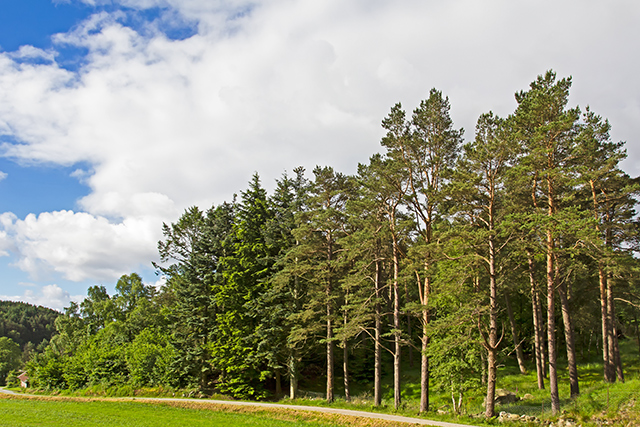
Well-rounded preppers are familiar with survival skills like hunting and fire starting. They are also knowledgeable when it comes to different kinds of trees and their many uses. (h/t to Survivopedia.com)
Whether you're lost in the woods or thinking of the next tree that you should plant in your homestead, it's important to know how you can use trees as a food source, for medicinal purposes, and even as a source of timber for building furniture or shelter.
Listed below are different trees that can improve the security at your homestead and provide you with various edibles like fruit and nuts.
Trees for defense and protection
If you want to protect your homestead from potential attackers, choose defensive trees that have symbiotic relationships with vine plants. An example includes trees that can act as the host for poison ivy. This particular vine can keep both wild animals and people away from your property.
- American plum (Prunus americana) – What the American plum lacks in size, it makes up for in long branches and suckers that can form a complicated bramble that will act as a deterrent for trespassers. Plum trees also produce delicious fruit that you can use to make fruit juice, jams, jellies, prunes, and wine. Prunes and prune juice can help treat constipation.
- Hawthorn (Crataegus) – A hawthorn tree has lots of thorns that will act as a natural fence. The limbs of young hawthorn trees can be trained to climb along long lines instead of growing upward. Doing this will produce a thick, natural fence that will maintain itself. Create a fence with several layers for better protection. Hawthorn can be used to lower blood pressure and boost heart health. Hawthorn can be used to make a tea that is full of antioxidants that are good for overall health. Hawthorn tea can also be used to treat symptoms of anxiety such as chest tightness and heart palpitations. Consult a healthcare professional to determine the right dose for your condition, and don't take hawthorn for more than two weeks.
- Jujube tree (Ziziphus jujuba) – Jujube trees can withstand extremely hot or cold temperatures and it can be used as a thorny natural fence tree. Jujube trees produce fruit that can be used fresh for food. Fruit from the tree can also be candied, dried for preservation, or ground for tea. Jujube fruit can even be turned into wine or vinegar for pickling. Jujube seeds have anti-fungal, anti-anxiety, contraceptive, immune boosting, and sedative properties. Additionally, parts of the tree or fruit can be used for treating wounds and to relieve stomach ulcers. (Related: Start today: Plant these food-producing trees on your property now.)
Trees that can be used for building materials and firewood
As a homesteader, you will need access to natural materials when building furniture or shelter. Below are some trees that can provide you with firewood and building materials.
- Cedar (Juniperus virginiana) – Cedarwood has a wonderful scent and is ideal for making furniture or cooking food such as salmon. Shavings from this tree can be used for animal bedding. Cedarwood is good for carving while its bark can help treat the symptoms of the common cold and the flu.
- Pine (Pinus strobus) – Pine is a soft wood but it grows fast so it is suitable for building, firewood, and other purposes. Pine also produces a resin that can be used as glue and roofing. Pine resin also has medicinal uses. Take note that it can be hard to grow pine trees from seeds. Sometimes, pine trees will only start growing after being digested by birds. You can start pine trees from cuttings or digging up young wild trees from areas that have a dense tree population.
- Walnut (Juglans regia) – The walnut tree can produce beautiful hardwood that you can use to create furniture or other items. These trees can reach over 100 feet in height so their wood can be used for flooring or other applications that require large, sturdy boards. The "nut" in the center of the fruit can be used in pies. Walnut fruit can also be used to make dyes and ink.
Not all of the trees listed above may grow in your local area, but planting a tree from each category ensures that you have a good variety of trees in your homestead. When choosing a type of tree for your land, select non-hybrid strains that can grow from either viable seeds or cuttings from the trees.
With these trees in your homestead, you can protect your property and have a steady source of food, medicine, and lumber even after SHTF.
Learn more about useful trees to have around your homestead at Homesteading.news.
Sources include:
Please contact us for more information.














